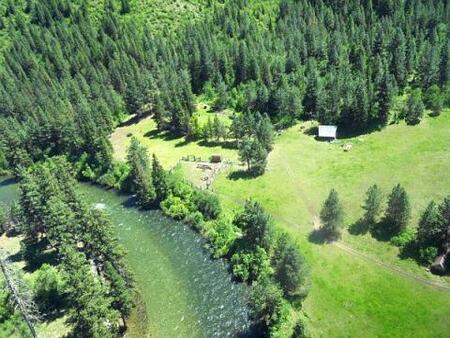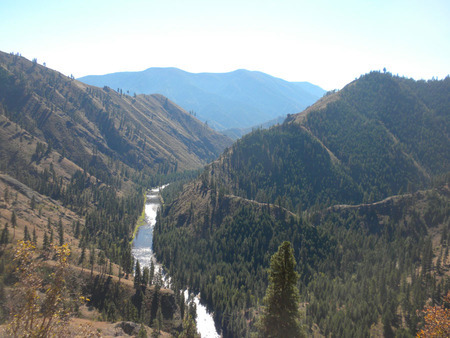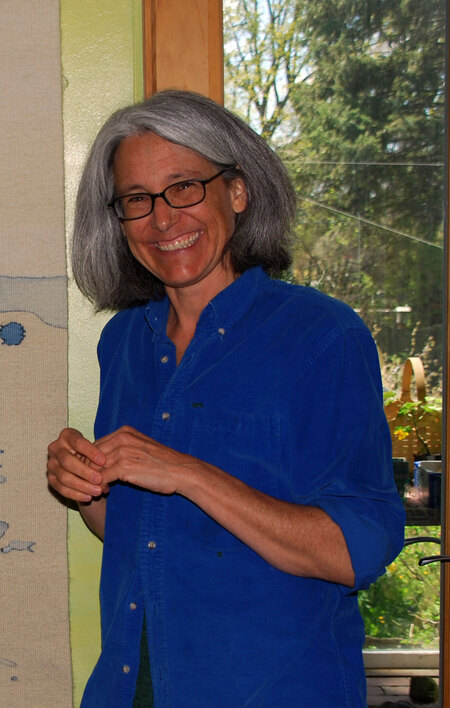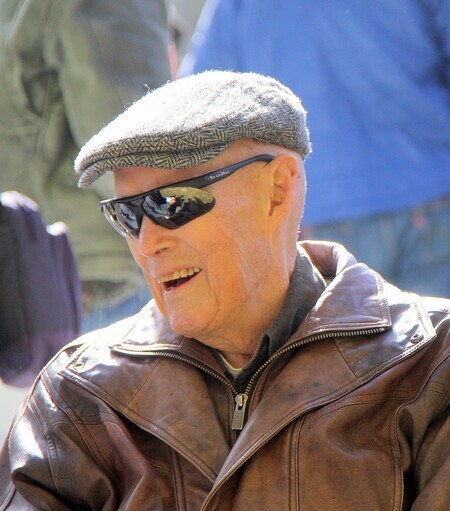Episode 23 : Wilderness Encounter : an interview with Sarah Swett Item Info
In this episode, titled, “Wilderness Encounter,” Sarah Swett and Bill Worf each recall an encounter that they had at Running Creek. In a short space of time, different philosophies met and collided, yet both people ultimately express their love of and respect for wilderness. Listen as the story is told during two different interviews of a Wilderness Encounter.
Episode 23 : Wilderness Encounter : an interview with Sarah Swett [transcript]
00:00:00:00 - 00:00:29:15 Debbie Lee or Jane Holman: Welcome to the Subway Bitterroot Wilderness History Project, which is made possible by a grant from the National Endowment for the Humanities. The University of Idaho, and Washington State University. Part of the project’s mission is to collect, preserve, and make public oral histories documenting the history and people of the subway. Bitterroot wilderness. For more information, please visit our website at SPW lib argue Idaho redo.
00:00:29:18 - 00:00:43:22 Debbie Lee or Jane Holman: And then I think people, I think people get so much out of being in a wilderness setting once you take away cars and money and telephones, people are different and they.
00:00:43:25 - 00:00:44:24 Sarah Swett: Are.
00:00:44:26 - 00:01:25:20 Debbie Lee or Jane Holman: Different to each other, I think. And, and, and then they draw on things in themselves that maybe are a little rusty from our crazy life out here. Now, I think the ways that people get along when they’re isolated in a place like that, that they place that they want to be familiar, is a wonderful thing.
00:01:25:22 - 00:01:49:21 Debbie Lee or Jane Holman: Thank you for joining us for the 23rd episode of the Selway Bitterroot Wilderness History Project. In this episode, titled wilderness Encounter, Sarah Swett and Bill Wharfe each recall an encounter that they had at Running Creek. In a short space of time, different philosophies met and collided, yet both people ultimately express their love of and respect for wilderness. Listen.
00:01:49:25 - 00:01:55:27 Debbie Lee or Jane Holman: As the story is told during two different interviews of a wilderness encounter.
00:01:55:29 - 00:02:09:15 Debbie Lee or Jane Holman: Yeah, well, how would you answer that question? What do different people want from wilderness? You must have seen every different oh, source of desire back there for wilderness.
00:02:09:18 - 00:02:28:18 Sarah Swett: Yeah. And there was you saw all of it and I couldn’t I don’t know, I mean, I, I people would come by to me and say, oh can I have some lemonade? Like they’re back for their wilderness experience, but they’d run out of lemonade. It’s like, well, drink water. You know, I have to bring all my stuff in here to oh, why are you here?
00:02:28:18 - 00:02:49:05 Sarah Swett: Or River of the River people? It’s all about. I mean, that’s a whole nother thing. That’s, you know, the obsession with the danger of the river and that by which I. I took a couple of little raft trips. I hitched rides, one of which I got out at Go Creek two days later, their raft had flipped and ladle or some horrible thing, and everybody almost died.
00:02:49:06 - 00:03:10:18 Sarah Swett: It was just awful. And it was like, could you idiots. What, what? Why do you need to pit yourself against this perfectly nice piece of land that’s just doing its thing. You know, the river is just running. Just let it run. Right. But some people, for some people, it’s a challenge. It’s something they need to conquer. And for others, it’s something that just can exist.
00:03:10:20 - 00:03:30:29 Sarah Swett: For others, it’s a place to live and it just where you happen to live. And certainly I for me, I just happen to have this series of events that belong to me there, and I’m deeply fortunate about that. But I it wasn’t a you know, it’s like being born and and living in Tennessee. Yeah. You know, it’s like, well, we’re going to go and live this not well.
00:03:30:29 - 00:03:47:06 Sarah Swett: It’s just where my parents had their place. And that’s where I grew up. And we lived there and we worked in the bar, you know, that was that’s what it is. And in that, even though I didn’t grow up there, it was just sort of a series of things that happened to me. And I think a lot more people tend to be like, oh, yes.
00:03:47:08 - 00:04:08:23 Sarah Swett: And then they have they have an idea about it. And I don’t understand that. Although one of my most odd moments at running Creek was mowing, we had mow lot because for fire and for snakes, those were sort of the two things in the house. It was this whole esthetic thing about The Nice Lawn and Dodie. It had this fabulous war on him.
00:04:08:26 - 00:04:26:17 Sarah Swett: It’s really important to maintain his law. so I was, but I had a riding mower, so they had the riding mower where I, you know, skimpy shorts and my braids 100 miles long, you know, driving around me and the trail, the main river trail went right by my gate, you know, there’s this little fence and then there’s the main river trip.
00:04:26:20 - 00:04:46:19 Sarah Swett: And this guy came by and he sort of was watching me for a bit with these dark glasses. And, so I don’t know, the water didn’t start easily, so I left it running and then went over and started to chat with them at the top of my the sound of the mower. And he was actually to ask me about the place and turned out it was Bill Warf.
00:04:46:21 - 00:05:08:00 Sarah Swett: Oh, who at that point was not yet blind. I guess he was going blind and was one of his last trips into the cellar, and he had tried really hard to by Running Creek, because he was at very much wanted to buy all the private places and get rid of them. And the hounds had outbid him because they could pay $1 million or whatever it was they had paid.
00:05:08:04 - 00:05:30:29 Sarah Swett: And there was I running my damn lawnmower. I mean, it must have been such an awful thing for him. It’s like, this is everything I didn’t want, and I’m having this chat with him. I remember what we talked about or how I learned that, all that background. But afterwards I just felt really small, you know, just I mean, I was it was my job.
00:05:30:29 - 00:05:51:21 Sarah Swett: I was the caretaker. I didn’t own it or anything, but at least I could turn the demo or off and, you know, be quiet. So we could have had a nice wilderness experience. But but that was really peculiar, that two completely opposite points of view about that wilderness meeting over that fence. And he walked on his way, and I climbed back on my mower and kept mowing.
00:05:51:23 - 00:05:55:08 Sarah Swett: And, there you have it. You know.
00:05:55:10 - 00:06:06:05 Debbie Lee or Jane Holman: It’s a great story. Thank you. Sarah.
00:06:06:08 - 00:06:37:11 Debbie Lee or Jane Holman: Yeah, I heard a story. I’m interviewing a lot of people. I heard a story about you recently, Sarah Sweat. Do you remember her? She was one of the caretakers at Running Creek. Oh, yeah. And then at, Oh, no, the other one. Well, star well aware punk Wolfenbarger was. Yeah. And she said she was out mowing the lawn at North Star one day with, you know, with, with a little tractor.
00:06:37:14 - 00:06:58:13 Debbie Lee or Jane Holman: And you are she she saw this guy walking by on the trail, just kind of glaring at her. And and she went over there and she said it was very worth. And she said, the worst person to see me mowing of lawn in the back country at the track.
00:06:58:16 - 00:07:07:07 Debbie Lee or Jane Holman: I don’t know if you remember that. I do, and you just. Did you guys exchanged words or anything? Oh, and.
00:07:07:09 - 00:07:09:23 Sarah Swett: I told her what I thought.
00:07:09:25 - 00:07:18:12 Debbie Lee or Jane Holman: She had some philosophy. So what would what would you have said to her? Like, this is wrong. You shouldn’t.
00:07:18:15 - 00:07:20:22 Sarah Swett: Yeah, yeah. Basically.
00:07:20:24 - 00:07:21:15 Debbie Lee or Jane Holman: Man.
00:07:21:17 - 00:07:23:09 Sarah Swett: You had a horse there. You that.
00:07:23:11 - 00:07:23:15 Debbie Lee or Jane Holman: Yeah.
00:07:23:21 - 00:07:33:07 Sarah Swett: No, probably not even that. I mean, you probably would have said let it grow. Yeah. Be natural. That’s what you were saying. Yeah. Yeah.
00:07:33:09 - 00:07:41:13 Debbie Lee or Jane Holman: Yeah. That’s you know. Yeah.
00:07:41:15 - 00:08:06:01 Debbie Lee or Jane Holman: Thank you for joining us for this episode of the Selway Bitterroot Wilderness History Project, which has been made possible by the National Endowment for the Humanities. The University Idaho and Washington State University. The project coordinator is Debbie Lee, recorded and produced by Aaron Jepson.
Gallery
- Title:
- Episode 23 : Wilderness Encounter : an interview with Sarah Swett
- Creator:
- Debbie Lee; Jane Holman; Sarah Swett
- Date Created (ISO Standard):
- 2011-05-11
- Description:
- Interviewee: Sarah Swett | Interviewer: Debbie Lee and Jane Holman | Location: Moscow, Idaho | Date: May 11, 2011 | In this episode, titled, 'Wilderness Encounter,' Sarah Swett and Bill Worf each recall an encounter that they had at Running Creek. In a short space of time, different philosophies met and collided, yet both people ultimately express their love of and respect for wilderness.
- Subjects:
- podcasts conservation personal recollections rangers women
- Section:
- Wilderness Voices
- Location:
- Selway-Bitterroot Wilderness (Idaho and Mont.)
- Publisher:
- Wilderness Voices, The Selway-Bitteroot Wilderness History Project, https://selwaybitterrootproject.wordpress.com/
- Original URL:
- https://selwaybitterrootproject.wordpress.com/2012/07/06/wilderness-encounter/
- Source Identifier:
- Selway-Podcast-ep23
- Type:
- Sound
- Format:
- audio/mp3
- Language:
- eng
- Preferred Citation:
- "Episode 23 : Wilderness Encounter : an interview with Sarah Swett", The Selway-Bitterroot Wilderness History Project, University of Idaho Library Digital Collections, https://www.lib.uidaho.edu/digital/sbw/items/sbw305.html
- Rights:
- Copyright: The Selway-Bitteroot Wilderness History Project. In Copyright - Educational Use Permitted. For more information, please contact University of Idaho Library Special Collections and Archives Department at libspec@uidaho.edu.
- Standardized Rights:
- http://rightsstatements.org/vocab/InC-EDU/1.0/




